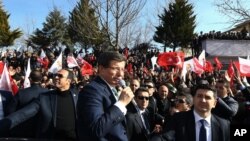Turkish Prime Minister Ahmet Davutoglu unveiled his strategy for ending the conflict there. But, despite his efforts, violence could escalate because of a decision by state prosecutors to lift the immunity from prosecution of leading Kurdish members of parliament.
Davutoglu chose the historical city of Mardin, in the center of the predominantly Kurdish southeast to unveil his plan to repair the conflict-strewn area.
Davutoglu, addressing local dignitaries, sought to reach out to those effected by fighting against the Kurdish rebel group the PKK.
"We will compensate the losses of all of our citizens due to terror. We will grow a rose garden at the site of the fire created by militants," he said.
The prime minister outlined what he called a 10-point Master Plan of Economic Development, rebuilding houses and establishing links with the local communities.
Immunity decision
But Davutoglu’s message of dialogue was undermined by an announcement the day before that state prosecutors had started proceedings to lift the immunity from prosecution of leading parliamentary members of the country's main pro-Kurdish HDP party who faced terrorism charges.
Political columnist for Al Monitor website and writer on Kurdish issues Kadri Gursel warns such a move would escalate the current conflict.
"This strategy of making it impossible for the Kurdish movement to express itself on the legal grounds, preventing them to use their rights in parliamentary politics, will further enhance and justify the grounds for using violence and terror," said Gursel.
Turkish President Recep Tayyip Erdogan has been on the forefront of demanding the prosecutions, as well as calling for the removal of local mayors in the pro-Kurdish party.
Observers say differences are growing between Erdogan and his prime minister over the handling of the conflict.
Balance of power
Political consultant Atilla Yesilada of Global Source Partners says those differences could end up changing the balance of power within the ruling AKP Party.
"If the war in the Southeast doesn't stop, there may be a rebellion in the party," said Yesilada. "I don't think the party will split, but the party apparatus may shift its alliance from Erdogan to Davutoglu and we may see him staking his position openly against Erdogan."
Last week a founding member of the ruling AKP and former deputy prime minister, Bulent Arinc, strongly criticized the president for his handling of the PKK conflict. Observers say, despite being strongly criticized by pro-Erdogan media, Arinc’s voice is likely to resonate within the AKP.




